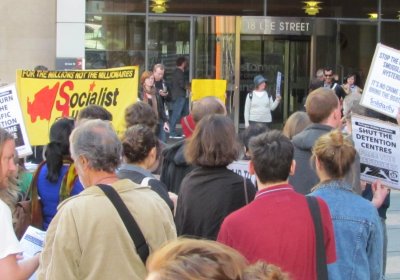Forty Tamil asylum seekers were flown to Nauru overnight on September 13, marking the beginning of Labor’s “Pacific solution” and a return to offshore processing. The group on Christmas Island were reported to have been under guard of federal police and did not resist. An earlier High Court decision on September 7 rejected the right of asylum seekers to appeal against pending deportations. The court ruling also makes possible further forced returns of refugees to danger.
Analysis
The results September 8 NSW local government elections have not been finalised yet, but results showed a 7% swing to the Liberals across the state. Many more Liberal councillors will take office than were elected in 2008.
The ALP suffered a statewide 6% swing against it and the Greens vote dropped 1%.
The Liberals picked up the most positions in former ALP strongholds in Sydney's west.
“RIP to the 2976 American people that lost their lives on 9/11 and RIP to the 48,644 Afghan and 1,690,903 Iraqi people that paid the ultimate price for a crime they did not commit. And the hundreds of thousands of Palestinians who experience this everyday. Your 9/11 is their 24/7.”
The above quote that flashed across the social media last week captured a reflection of many people about the terrible collective punishment still inflicted on innocent people right across the Middle East and beyond for the September 11, 2001, terror attacks in the US.
Pointing to swings of 10-20% in parts of western Sydney to Liberal candidates standing in the September 8 local council elections, media commentators are claiming traditional working class areas have deserted Labor and rejected the Greens, instead choosing to shift rightwards.
The Sydney Morning Herald headlined its September 10 edition: “Change in the air as Libs take over Labor strongholds.”
The Australian government has bowed to public pressure and banned the supertrawler from operating in Australian waters for two years. During this time more scientific research will be completed into the effects the supertrawler would have on local fish stocks.
The supertrawler, known as the Margiris before changing its name to the Abel Tasman, is the world's second-largest trawler and would have been the largest ship ever to fish in Australian waters. The 142-metre-long ship had a quota of 18,000 tonnes, which it would have caught with its 300-metre-long net.
The article below first appeared at The Conversation on September 11. Claire Parfitt is a research student at the University of Sydney. She is affiliated with the Australian Food Sovereignty Alliance and is a coordinator of the People's Food Plan project.
***
The Coalition New South Wales government released its Strategic Regional Land Use Policy on September 11. The public was told the policy would protect land and water from the impacts of mining and coal seam gas (CSG) development.
Instead it is a policy to develop CSG and mineral mining in the state — despite well-evidenced risks and enormous community opposition — and breaks a slew of promises made to the people of NSW.
Australian lawyer and human rights activist Kellie Tranter gave the speech below at a September 12 forum at NSW parliament house titled "Assange, WikiLeaks & the Law in a Post 9/11 World". The forum was hosted by Greens MLC David Shoebridge with the Support Assange and WikiLeaks Coalition and the Sydney Stop the War Coalition.
* * *
Australian lawyer and human rights activist Kellie Tranter spoke at a September 12 forum at NSW parliament house titled "Assange, WikiLeaks & the Law in a Post 9/11 World". The forum was hosted by Greens MLC David Shoebridge with the Support Assange and WikiLeaks Coalition and the Sydney Stop the War Coalition.
The Socialist Alliance released the statement below on September 10.
* * *
The Socialist Alliance condemns the Australian government’s ongoing support for Indonesian security forces, particularly the Detachment 88 “counter-terrorism” unit implicated in human rights abuses in the occupied nation of West Papua and elsewhere in Indonesia.
Everywhere you look these days, things are turning green. In Chiapas, Mexico, indigenous farmers are being paid to protect the last vast stretch of rainforest in Mesoamerica. In the Brazilian Amazon, peasant families are given a monthly “green basket” of basic food staples to allow them to get by without cutting down trees. In Kenya, small farmers who plant climate-hardy trees and protect green zones are promised payment for their part in the fight to reduce global warming.
Much of my understanding of the issues facing Aboriginal Australians comes from my experience of living and working with Aboriginal people who still speak their own languages at home and live largely on their own land or on communities close to their traditional lands. It’s important to remember that these populations are a minority among Aboriginal and Torres Strait Islander people today. So at one level, my focus may seem largely irrelevant to the situations and struggles of the vast majority of Aboriginal people.
- Previous page
- Page 399
- Next page









